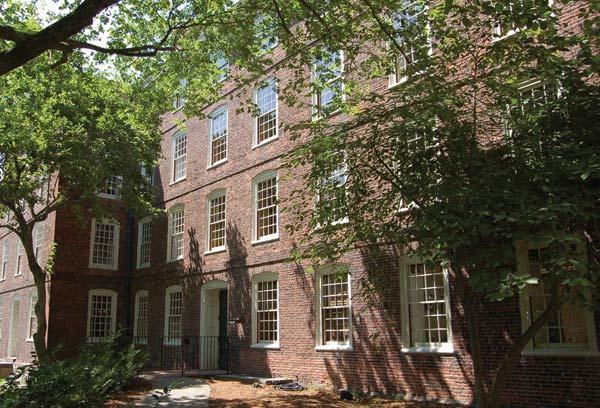Brown's Religious Heritage Part of University's 250th Anniversary
By Catherine Elvy, Staff Writer In March, Brown University kicked off a 15-month celebration of its 250th anniversary with a dazzling fireworks display and 600-pound birthday cake replicating its iconic University Hall.
In March, Brown University kicked off a 15-month celebration of its 250th anniversary with a dazzling fireworks display and 600-pound birthday cake replicating its iconic University Hall.Brown is staging exhibits, speeches, performances, and a series of events through commencement 2015 to pay tribute to the university's founding in 1764 in the colonial outpost of Rhode Island.
"We want to use this opportunity to reflect on our history, to think about Brown today and in the future," said President Christina Paxson, Columbia Ph.D. '87 and a former Princeton University administrator.
As part of the commemorative efforts, Brown is showcasing an interactive timeline that includes a look back at the university's religious roots, which were intertwined with the birth of a new nation.
In the early 1760s, the Baptists represented one of the fastest growing denominations in British North America, but the faithful lacked a college, according to Brown historian Gordon Wood, Harvard Ph.D. '64.
In contrast, the Puritans oversaw the establishment of the predecessors to Harvard and Yale universities, while the Anglicans were instrumental in the founding of the College of William and Mary and the forerunners to Columbia and Penn. Likewise, the Presbyterians were behind the predecessor to Princeton University.
In 1763, the Philadelphia Association of Baptist Churches sent Rev. James Manning to Rhode Island, the cradle of American Baptists, to found a college. In addition to being one of the few colonies without a college, Rhode Island sheltered more than 22,000 Baptists, about 80 percent of New England's total, according to Brown.
Hence, on March 3, 1764, a royal charter reflecting the work of Manning and other patriarchs birthed "the College or University in the English Colony of Rhode Island and Providence Plantations in New England in America." Manning, a 1762 alumnus of Princeton's predecessor, served as the inaugural president.
"It was where you became a gentleman," Wood told Rhode Island Public Radio. The professor emeritus also noted early graduates went on to become physicians, ministers, and politicians.
Among other highlights from the university's commemorative materials:
- In 1638, Rev. Chad Brown, patriarch of the region's Brown family, migrated to Massachusetts Colony from England. After arriving in Providence, he took leadership of the First Baptist Church in America and operated farmland that became the site of Brown University.
- In 1756, early Baptists established the Hopewell Baptist Academy in New Jersey to prepare youths for ministerial service. The secondary school instructed some of the men who were instrumental in founding Brown's forerunner, including Manning.
- In 1764, Rhode Island's legislature established its first institution of higher education, at the time the third college in New England and only the seventh in the future United States. In the colony's noted spirit of religious freedom, the college's founding document stated, "That into this liberal and catholic institution shall never be admitted any religious tests; but, on the contrary, all the members hereof shall forever enjoy full, free, absolute, and uninterrupted liberty of conscience."
- Manning was the college's first and initially sole professor. He oversaw the first commencement and moved the College of Rhode Island from the town of Warren to its permanent home in Providence.
- The college's first student was its only student. During its initial year, 14-year-old William Rogers studied along with Manning in the parsonage of the Baptist church in Warren.
- After graduating in 1769, Rogers served as a chaplain in the Continental Army and later labored as the pastor of the First Baptist Church in Philadelphia.
- In 1769, seven men received degrees at the first commencement, which was held at the Baptist chapel in Warren. Initiating a tradition of commencement debates, the students offered arguments on the statement: "The Americans, in their present circumstances, cannot, consistent with good policy, affect to become an independent state."
- The Brown family was associated with the College of Rhode Island from its inception. The merchant brothers, Nicholas, Joseph, John, and Moses, contributed to funding buildings, endowing chairs, and more.
- Nicholas Brown, great-grandson of Chad Brown, gave $5,000 in 1804 that resulted in a new name, Brown University.
- After years of competition among the communities of Rhode Island and strong advocacy by the Brown family and civic leaders, the college chose Providence as its permanent home.
- After the selection of Providence, construction began on the first building for the new campus. Later, College Edifice was renamed University Hall.
Appropriately, impressive fireworks punctuated the sky over the historic College Green in March as Brown initiated its first round of semiquincentennial celebrations.
There, Paxson reminded a crowd of revelers, munching on cake from a sugary replica of University Hall, that Brown's mission involves the "discovery and transmission of knowledge across generations."





